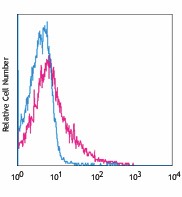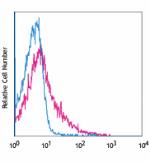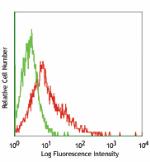- Clone
- T5-39 (See other available formats)
- Regulatory Status
- RUO
- Other Names
- LIGHT, TL5, TNFSF14, TR2 ligand, Ligand for herpesvirus entry mediator, tumor necrosis factor receptor-like-2 ligand, tumor necrosis factor ligand superfamily member 14 (TNFSF14)
- Isotype
- Mouse IgG2b, κ
- Ave. Rating
- Submit a Review
- Product Citations
- publications

-

PMA/ionomycin-stimulated human peripheral blood lymphocytes (day-2) stained with biotinylated T5-39, followed by Sav-PE
| Cat # | Size | Price | Quantity Check Availability | Save | ||
|---|---|---|---|---|---|---|
| 318704 | 100 µg | 184€ | ||||
The T5-39 antibody recognizes human LIGHT (CD258) also known as ligand for herpesvirus entry mediator, tumor necrosis factor receptor-like-2 ligand, TR2 ligand, and tumor necrosis factor ligand superfamily member 14 (TNFSF14). LIGHT is a type 2 transmembrane protein, and a member of the tumor necrosis factor ligand superfamily. LIGHT can be proteolytically cleaved and two isofoms have been shown to be produced by alternative splicing. The apparent molecular weight of LIGHT us approximately 30 kD. LIGHT expression has been observed in spleen, brain and kidney; expression is upregulated on activated T cells (particularly CD8+ cells). LIGHT stimulates proliferation of T cells and inhibits growth of some tumor cells. This protein has been shown to play a role in intestinal inflammation and contribute to IgA nephropathy. LIGHT is a ligand for HVEM, and LTβR and has also been shown to bind DcR3 and modulate function. In addition, LIGHT has been shown to interact with other proteins including TRAF2, TRAF3, and DIABLO. The T5-39 antibody has been shown to be useful for flow cytometry and ELISA.
Product DetailsProduct Details
- Verified Reactivity
- Human
- Reported Reactivity
- Rhesus
- Antibody Type
- Monoclonal
- Host Species
- Mouse
- Immunogen
- recombinant human LIGHT (TL5) protein
- Formulation
- Phosphate-buffered solution, pH 7.2, containing 0.09% sodium azide.
- Preparation
- The antibody was purified by affinity chromatography, and conjugated with biotin under optimal conditions.
- Concentration
- 0.5 mg/ml
- Storage & Handling
- The antibody solution should be stored undiluted between 2°C and 8°C. Do not freeze.
- Application
-
FC - Quality tested
- Recommended Usage
-
Each lot of this antibody is quality control tested by immunofluorescent staining with flow cytometric analysis. For flow cytometric staining, the suggested use of this reagent is ≤2.0 µg per million cells in 100 µl volume. It is recommended that the reagent be titrated for optimal performance for each application.
- RRID
-
AB_830862 (BioLegend Cat. No. 318704)
Antigen Details
- Structure
- Type 2 transmembrane protein, member of the tumor necrosis factor ligand superfamily. Can be proteolytically cleaved; two isofoms produced by alternative splicing. Apparent molecular weight approximately 30 kD.
- Distribution
-
Spleen, brain and kidney. Upregulated on activated T cells (particularly CD8+ cells)
- Function
- Stimulates proliferation of T cells, inhibits growth of some tumor cells. Has been shown to play a role in intestinal inflammation and contribute to IgA nephropathy
- Interaction
- TRAF2, TRAF3, DIABLO
- Ligand/Receptor
- Ligand for HVEM, LTβR. Has also been shown to bind DcR3
- Cell Type
- T cells
- Biology Area
- Cell Biology, Immunology
- Molecular Family
- CD Molecules, Cytokine/Chemokine Receptors
- Antigen References
-
1. Mauri DN, et al. 1998. Immunity 8:21.
2. Harrop JA, et al. 1998. J. Biol. Chem. 273:27548.
3. Morel Y, et al. 2000. J. Immunol. 165:4397.
4. Wang J, et al. 2004. J. Clin. Invest. 113:826.
5. Yu P, et al. 2004. Nature Immunol. 5:141. - Gene ID
- 8740 View all products for this Gene ID
- UniProt
- View information about CD258 on UniProt.org
Related FAQs
- How many biotin molecules are per antibody structure?
- We don't routinely measure the number of biotins with our antibody products but the number of biotin molecules range from 3-6 molecules per antibody.
Other Formats
View All CD258 Reagents Request Custom Conjugation| Description | Clone | Applications |
|---|---|---|
| Biotin anti-human CD258 (LIGHT) | T5-39 | FC |
| PE anti-human CD258 (LIGHT) | T5-39 | FC |
| PE/Cyanine7 anti-human CD258 (LIGHT) | T5-39 | FC |
| APC anti-human CD258 (LIGHT) | T5-39 | FC |
| TotalSeq™-C1056 anti-human CD258 (LIGHT) | T5-39 | PG |
| TotalSeq™-D1056 anti-human CD258 (LIGHT) | T5-39 | PG |
| TotalSeq™-B1056 anti-human CD258 (LIGHT) | T5-39 | PG |
Compare Data Across All Formats
This data display is provided for general comparisons between formats.
Your actual data may vary due to variations in samples, target cells, instruments and their settings, staining conditions, and other factors.
If you need assistance with selecting the best format contact our expert technical support team.
-
Biotin anti-human CD258 (LIGHT)

PMA/ionomycin-stimulated human peripheral blood lymphocytes ... -
PE anti-human CD258 (LIGHT)

PMA/ionomycin-stimulated (day-2) human peripheral blood lymp... -
PE/Cyanine7 anti-human CD258 (LIGHT)

PMA/ionomycin-stimulated (day-2) human peripheral blood lymp... -
APC anti-human CD258 (LIGHT)

PMA/ionomycin-stimulated (day-2) human peripheral blood lymp... -
TotalSeq™-C1056 anti-human CD258 (LIGHT)
-
TotalSeq™-D1056 anti-human CD258 (LIGHT)
-
TotalSeq™-B1056 anti-human CD258 (LIGHT)
 Login / Register
Login / Register 










Follow Us